Featured
Sugar production hurt due to dry weather
Soybeans closed near unchanged and Soybean Meal closed a little higher in consolidation trading. The market is waiting for the next WASDE report that is expected to show strong export and domestic demand and reduced ending stocks. Selling probably came on ideas that the impending Brazil harvest will kill current demand for US Soybeans. The harvest has been delayed due to late planting dates early due to dry weather.
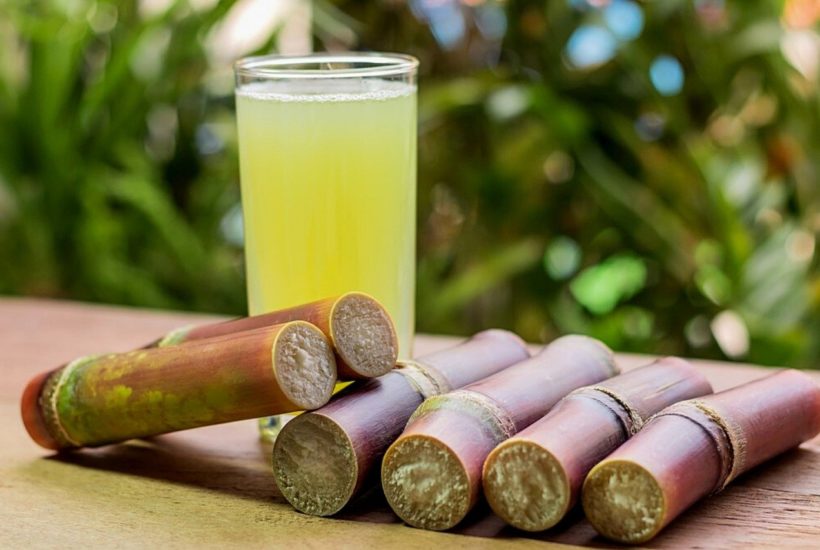
Wheat
Wheat markets were lower with Chicago SRW losing the most and Minneapolis Spring the least. There was not much bullish news for the market. The Egyptian tender last week showed European and Russian participation, with the Russian offers a surprise to the market given the increased state taxes on agricultural exports. The US Dollar turned firmer last week and hurt demand ideas for US Wheat in the world market. Most traders now expect less or no Wheat offers from Black Sea ports after the middle of March. No one is sure about Russia and its new tax regime. Russia is raising its export taxes in mid-March but farmers there are not selling. The Russian government move has apparently caused lower prices internally and farmers have reportedly pulled back for the market. Great Plains weather is currently very cold, but not considered cold enough to damage much if any, Wheat.
Weekly Chicago Soft Red Winter Wheat Futures
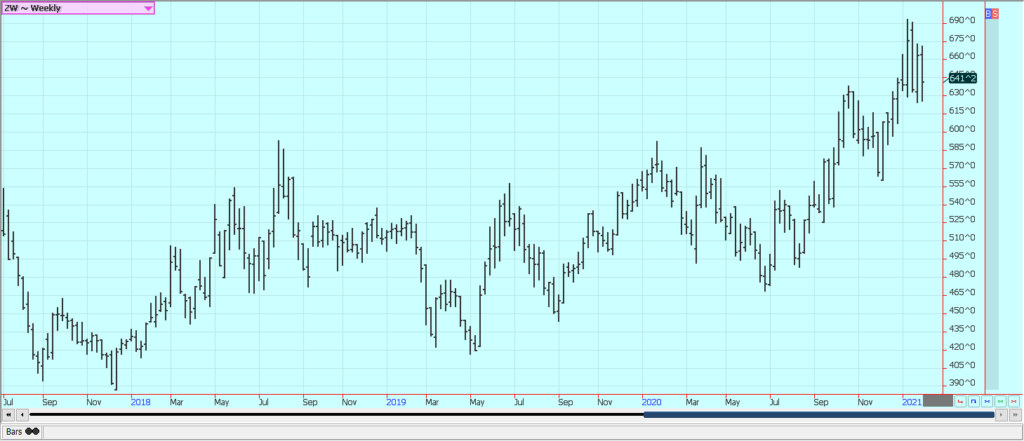
Weekly Chicago Hard Red Winter Wheat Futures
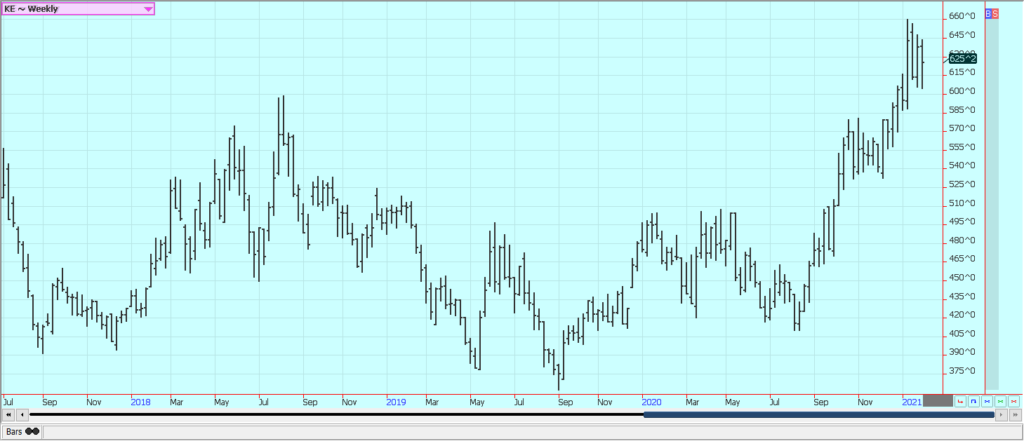
Weekly Minneapolis Hard Red Spring Wheat Futures
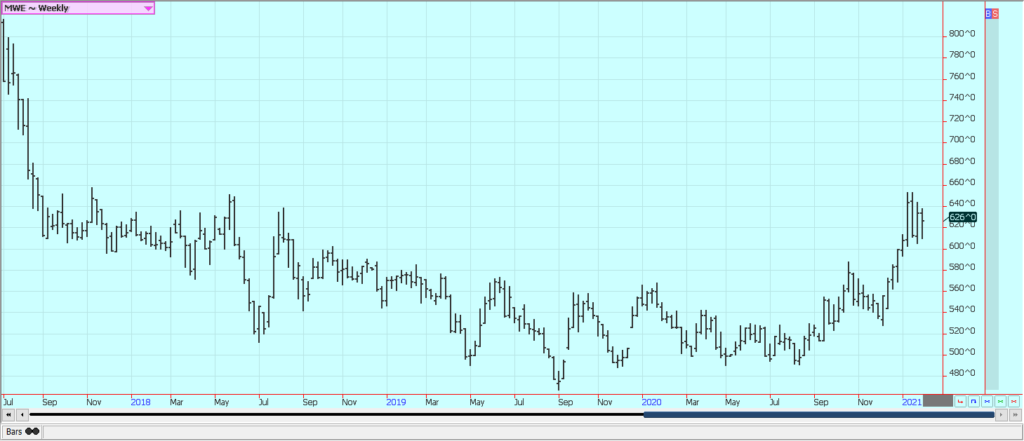
Corn
Corn was a little higher and Oats were a little lower in consolidation trading. USDA confirmed the big weekly export sales in Corn with almost all of the demand from China. Ideas are that USDA will now increase export demand and cut ending stocks estimates in the WASDE report tomorrow. China booked more than 6.0 million tons of US Corn. Export demand has held relatively strong as US Corn is about the cheapest feed grain in the world market. It has rained in central and parts of northern Brazil in the last week. Southern Brazil and Argentina are now drier after some recent heavy rains. The main crop harvest has started in parts of Brazil, but progress will be slow due to the late planting dates due too dry conditions earlier in the year. The second crop of Corn planting is also being delayed and yield estimates for South American Corn have been reduced.
Weekly Corn Futures:
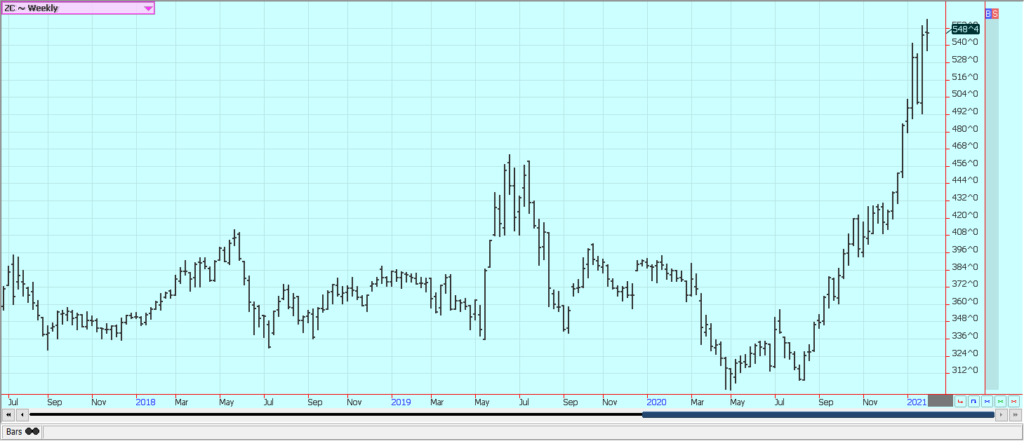
Weekly Oats Futures
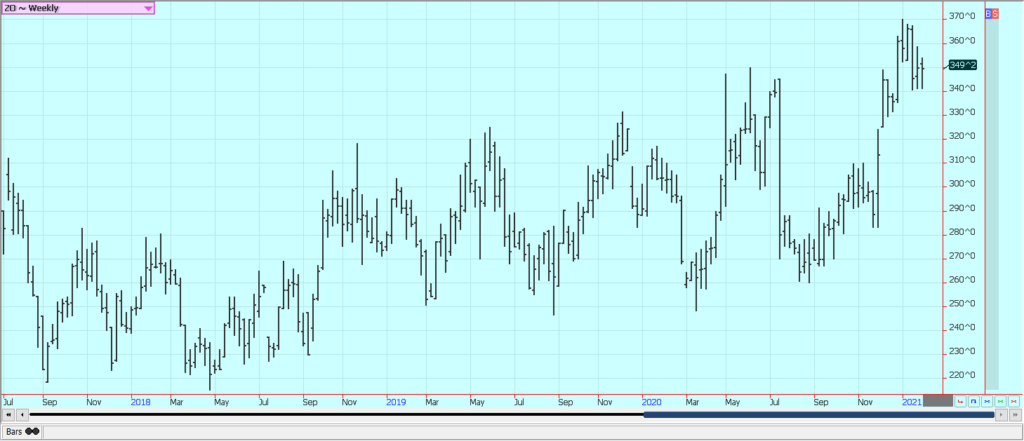
Soybeans and Soybean Meal
Soybeans closed near unchanged and Soybean Meal closed a little higher in consolidation trading. The market is waiting for the next WASDE report that is expected to show strong export and domestic demand and reduced ending stocks. Selling probably came on ideas that the impending Brazil harvest will kill current demand for US Soybeans. The harvest has been delayed due to late planting dates early due to dry weather and now too much rain that has caused harvest delays and some quality problems as well. Rains are coming to an end in some areas so harvest activities should increase this week. China has been buying for this year and next year here. There is little sign the US price has rationed demand. Export demand reports from USDA were weaker last week for old crop Soybeans, but very strong for new crop Soybeans. The strong demand for exports and for domestic use means there is little room for error and that the US could even come close to running out of Soybeans to sell.
Weekly Chicago Soybeans Futures:
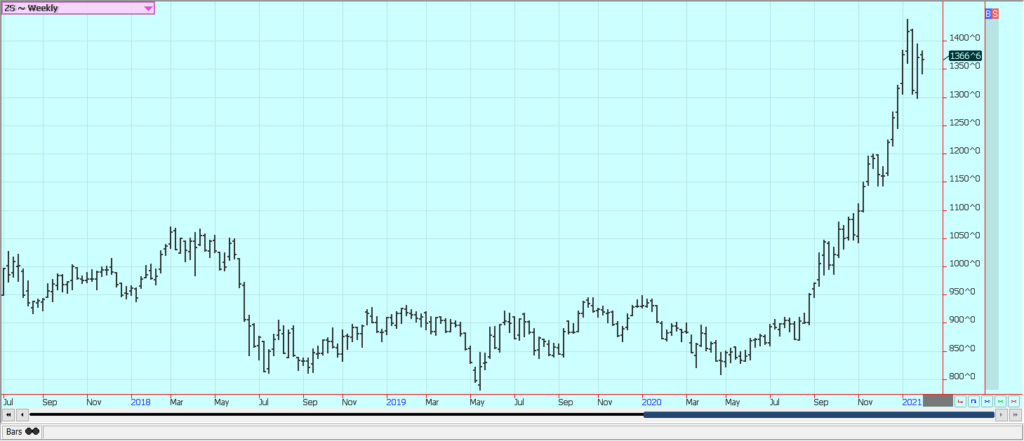
Weekly Chicago Soybean Meal Futures
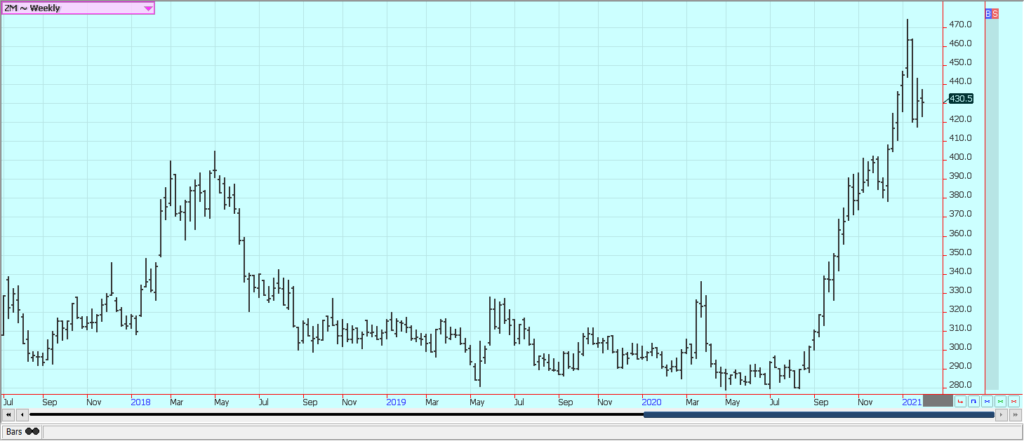
Rice
Rice was lower last week on what appeared to be speculative long liquidation. The cash market has not felt any increased demand lately and mill operations are reported to be on the slow side. Exports had been strong until recently and were moderate last week. Texas is about out of Rice, but there is Rice available in the other states. Asian and Mercosur markets have firmed recently but this has not yet affected the US world price that much.
Weekly Chicago Rice Futures
Palm Oil and Vegetable Oils
Palm Oil closed a little lower as export volumes were much less in January. Ideas are that production is down significantly as well, so there is talk of reduced ending stocks estimates from MPOB when the report is released this week. The production of Palm Oil is down in both Malaysia and Indonesia as plantations in both countries are having trouble getting workers into the fields. Wet weather has caused even more delays. It’s a tug of war now between demand side bears and supply side bulls. Soybean Oil and Canola closed near unchanged for the week on ideas of increasing demand, and Canola also got talk of tight supplies due to reduced offers from farmers and reduced production earlier in the year. StatsCan released its stocks estimates on Friday and stocks were just over 10 million tons, down 4 million tons from a year ago. The majority are still on the farm.
Weekly Malaysian Palm Oil Futures:
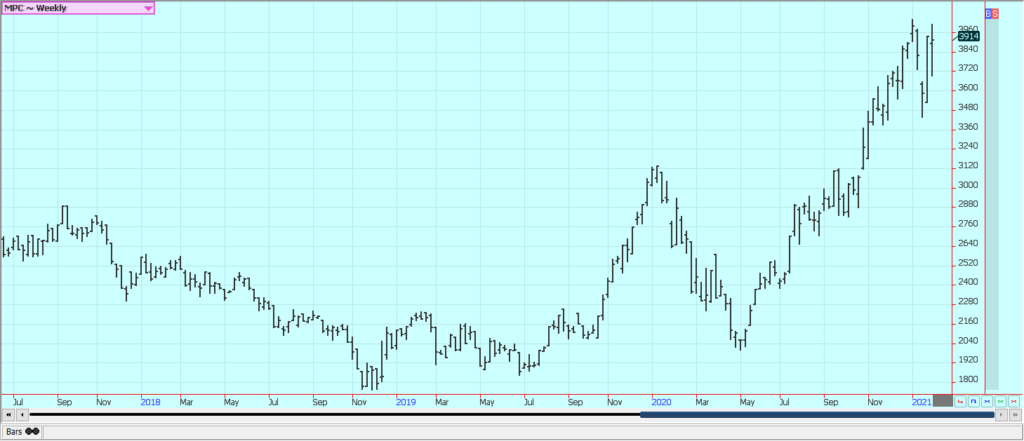
Weekly Chicago Soybean Oil Futures
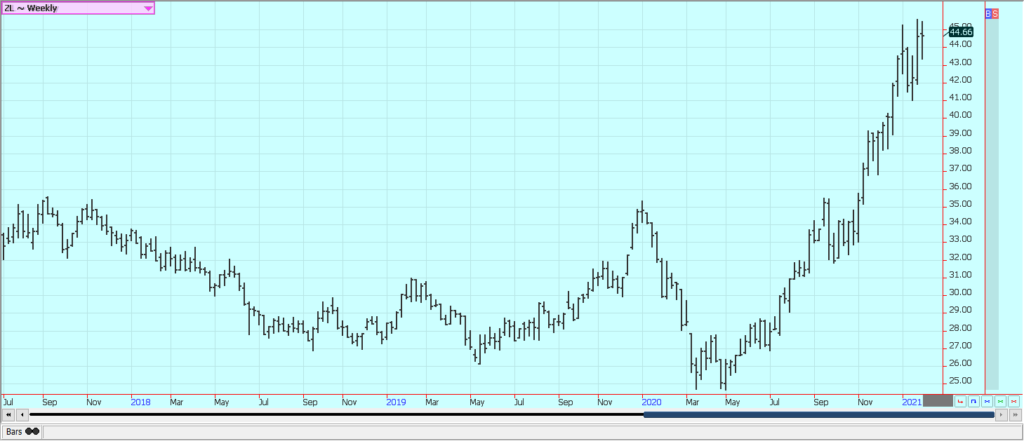
Weekly Canola Futures:
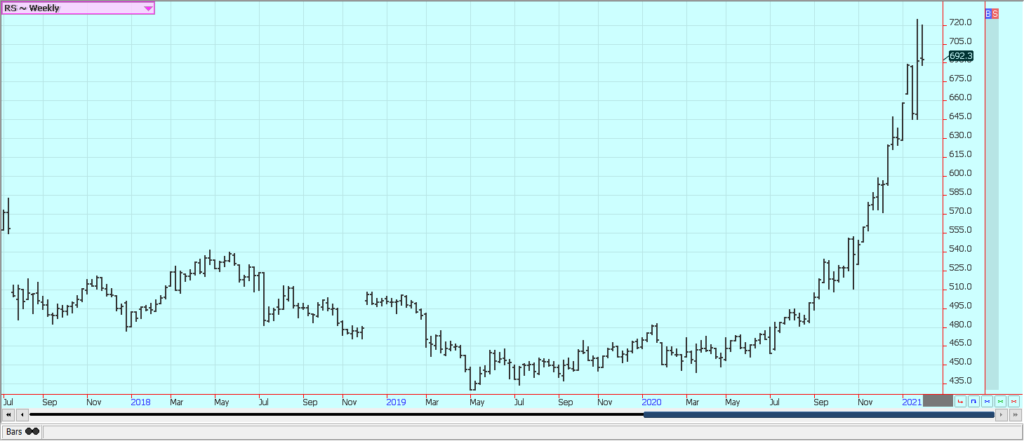
Cotton
Futures were higher for the week and made a new high close despite a significant move lower on Friday. The selling was probably speculative long liquidation. The weekly export sales report on Thursday showed solid demand for US Cotton and the demand has been strong even with the Coronavirus around and getting worse. The overall weaker US Dollar has helped demand ideas as well although the Dollar has started to firm recently. The US stock market has been generally firm to help support ideas of a better economy here and potentially increased demand for Cotton products. Production was rated as less in the most recent USDA production reports so supplies could turn tight if the demand remains strong.
Weekly US Cotton Futures
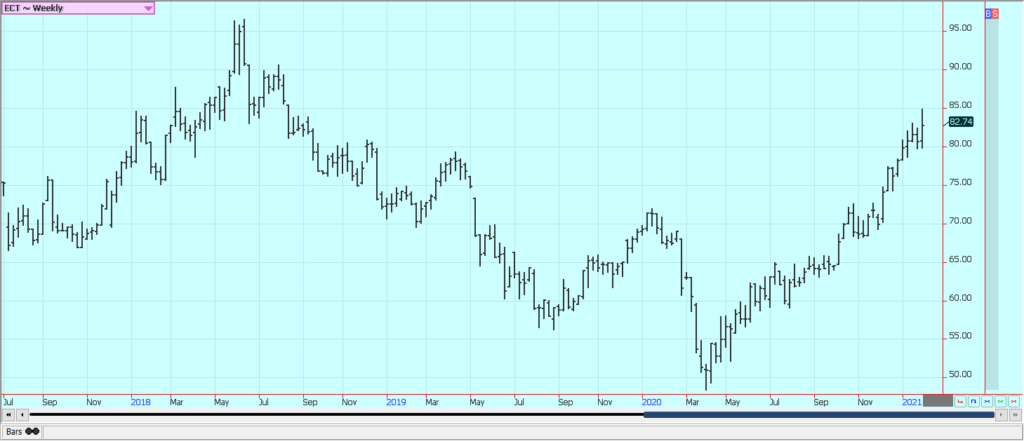
Frozen Concentrated Orange Juice and Citrus
FCOJ closed higher in consolidation trading. Trends are trying to turn up on the daily charts. Freezing temperatures were reported in Florida last week but were not cold enough for a long enough time to damage any crops. More cold temperatures are possible this week. The weather in Florida remains good for the crops and the harvest is active. The Coronavirus is still promoting consumption of FCOJ at home. Restaurant and food service demand has been much less as no one is dining out. The weather in Florida is good with a few showers to promote good tree health and fruit formation. Showers are falling in Brazil now and crop conditions are called good. Mexican crop conditions are called good with rains, but earlier dry weather might have hurt production. The rains now are covering Veracruz and immediate areas, but not other growing areas of Mexico.
Weekly FCOJ Futures
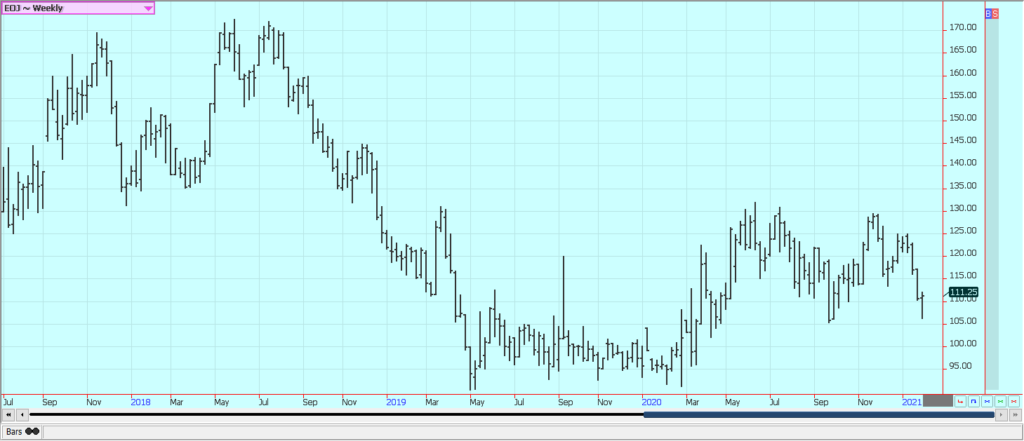
Coffee
Futures were a little higher in New York and in London last week as the weather in Brazil became more important and as Vietnam producers stopped selling before the Tet holiday. There are reports of good weather in Vietnam for the harvest. However, Brazil has been dry for flowering and initial fruit development and it has been warm and dry now. Rains are now in the forecast that could be very beneficial. Vietnam has harvested its production under mostly dry conditions. Some of those crops are starting to hit the market but farmers are unhappy with the price and are getting ready for Tet. Central America is also drier for harvesting. Good growing conditions are reported in Colombia and Peru. The demand from coffee shops and other food service operations is still at very low levels. Reports indicate that consumers at home are consuming blends with more Robusta and less Arabica.
Weekly New York Arabica Coffee Futures
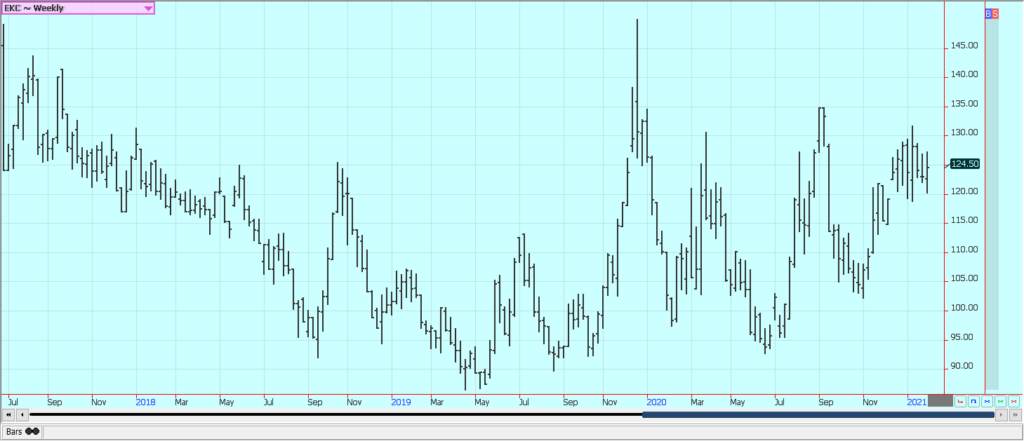
Weekly London Robusta Coffee Futures
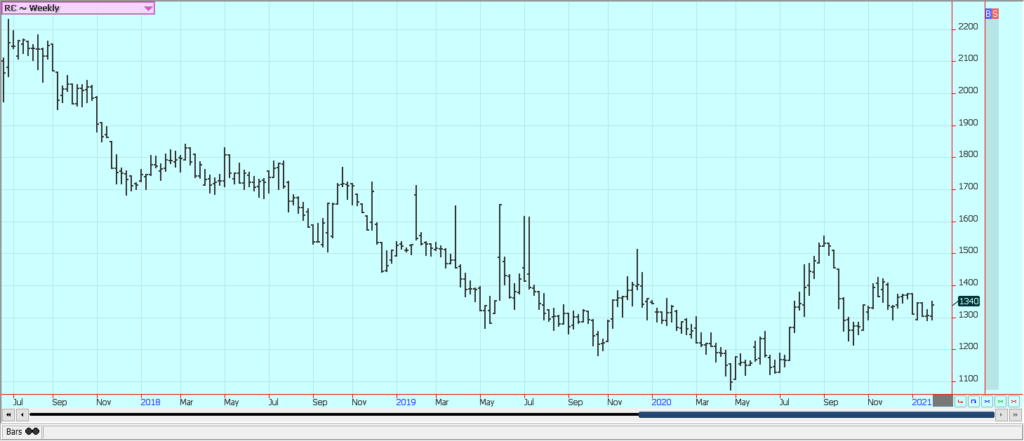
Sugar
New York and London closed higher and made new highs for the move. Ideas of increased demand are still around. China is done buying for now but other countries have stepped into the void and are buying. Rains were reported again in Brazil. It has been raining in south central Brazil and the production of cane is winding down for the season. The rains have come late to the region but they are supporting whatever crops are still in the ground now. Production has been hurt due to dry weather earlier in the year. India has a very big crop of Sugarcane this year but no exports are coming out as the government has been very slow to approve export subsidies. The crop is getting bigger as the country reported increased production over the last couple of months. Thailand might have less this year due to reduced planted area and erratic rains during the monsoon season. The EU Sugar crop is less this year as is the crop in Russia.
Weekly New York World Raw Sugar Futures
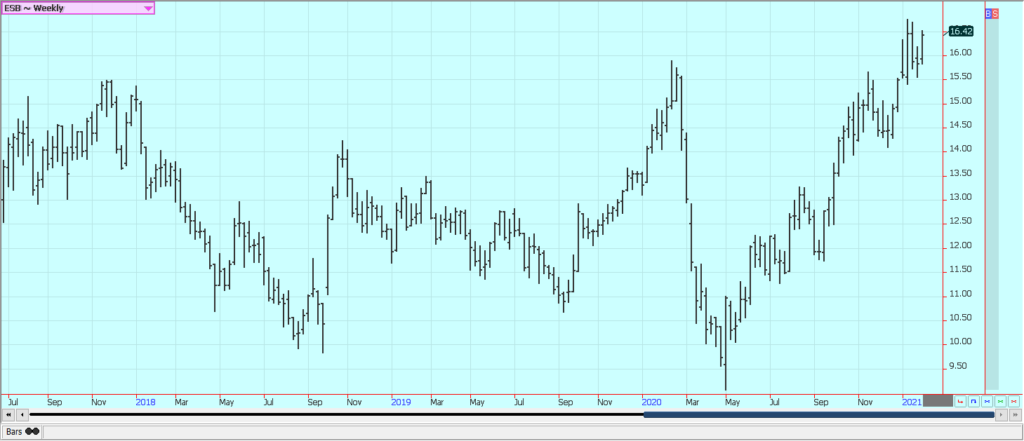
Weekly London White Sugar Futures
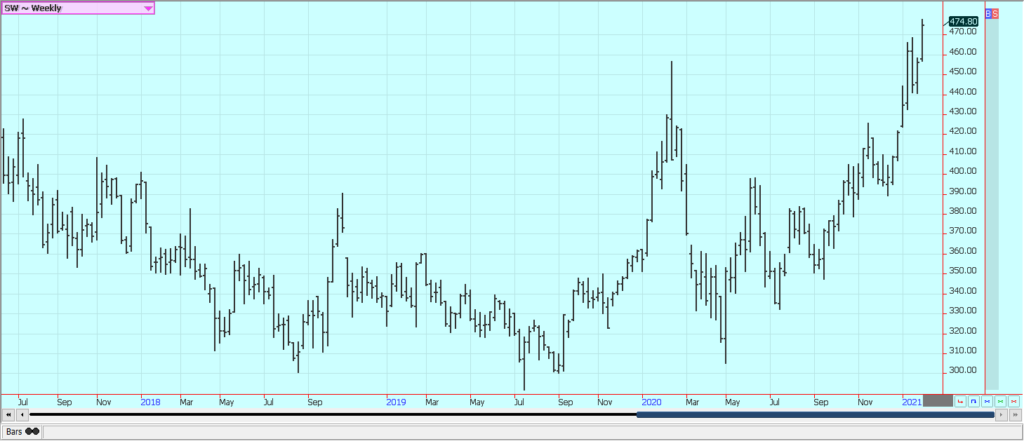
Cocoa
New York and London closed higher and chart trends are mixed again. There were reports of demand for Cocoa in Ivory Coast, although the reports noted that there is a lot to sell there. The grind data has been weaker again implying less demand for chocolate. Ivory Coast has not been shipping as exporters have asked to hold off. There are ideas of big supplies at origin. Arrivals in Ivory Coast are now1.337 million tons, down 3% from last year.
Weekly New York Cocoa Futures
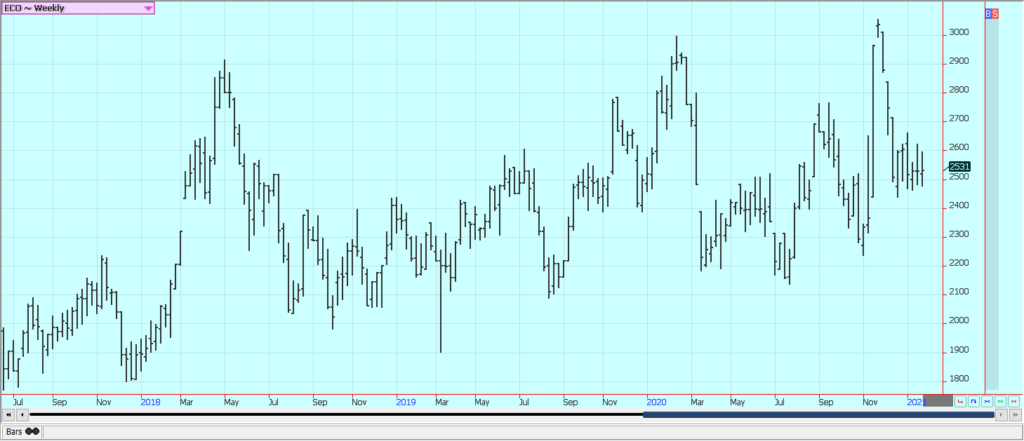
Weekly London Cocoa Futures
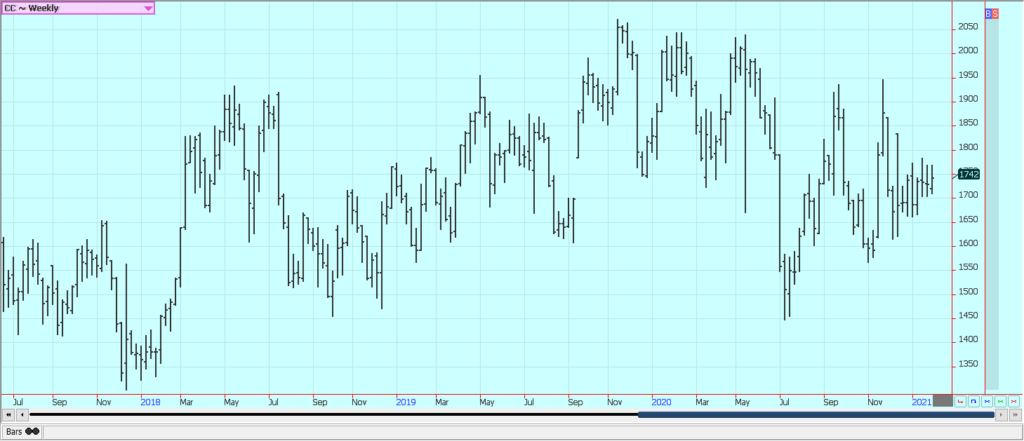
__
(Featured image by jmexclusives via Pixabay)
DISCLAIMER: This article was written by a third party contributor and does not reflect the opinion of Born2Invest, its management, staff or its associates. Please review our disclaimer for more information.
This article may include forward-looking statements. These forward-looking statements generally are identified by the words “believe,” “project,” “estimate,” “become,” “plan,” “will,” and similar expressions. These forward-looking statements involve known and unknown risks as well as uncertainties, including those discussed in the following cautionary statements and elsewhere in this article and on this site. Although the Company may believe that its expectations are based on reasonable assumptions, the actual results that the Company may achieve may differ materially from any forward-looking statements, which reflect the opinions of the management of the Company only as of the date hereof. Additionally, please make sure to read these important disclosures.

-

 Biotech5 days ago
Biotech5 days agoInterministerial Commission on Drug Prices Approves New Drugs and Expanded Treatment Funding
-

 Africa2 weeks ago
Africa2 weeks agoMorocco’s Tax Reforms Show Tangible Results
-

 Fintech1 day ago
Fintech1 day agoPomelo Raises $160 Million to Power AI-Driven Digital Payments Across Latin America
-

 Biotech1 week ago
Biotech1 week agoUniversal Nanoparticle Platform Enables Multi-Isotope Cancer Diagnosis and Therapy
























